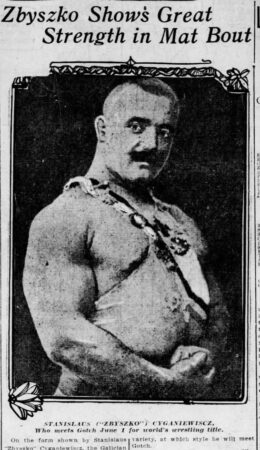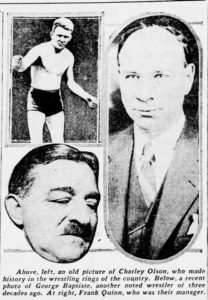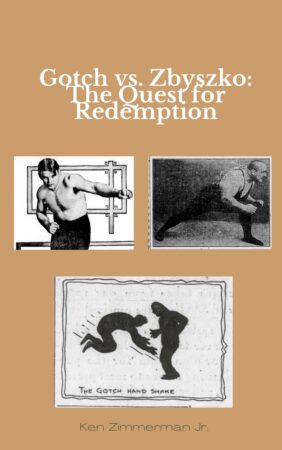Stanislaus Zbyszko Beats Charley Olson
Stanislaus Zbyszko traveled to the United States in 1909 seeking a match with recognized World Heavyweight Wrestling Champion Frank Gotch. To get in shape for this challenge and build anticipation for the title match, Zbyskzo toured most of the major cities in the United States.
During May 1910, Zbyszko arrived in St. Louis for his match with capable wrestler Charles Olson. Olson was often based out of St. Louis although prior to this match, Olson had been wrestling in other cities. Olson was still the biggest name in St. Louis wrestling, so promoters brought him back for the match with Zbyszko. The men wrestled on May 29, 1910, four days before Zbyszko’s title match with Gotch.

Photo of Stanislaus Zbsyzko from page 10 of the May 30, 1910 edició de St. Louis Post-Dispatch (Domini Públic)
Depending on which source you believe, Stanislaus Zbyszko stood between five feet, six inches and five feet, ten inches tall. Powerfully built, Zbyszko’s weight fluctuated between 225 i 260 lliures.
Charley Olson was a light heavyweight. Olson wrestled best between 160 i 170 lliures. He claimed to weigh 190 pounds for this match, but ringside reporters did not see a large increase in his weight. Promoters or managers embellished Olson’s weight to hype Olson as a more formidable challenge for the bowling ball like Zbyszko.

Photo from the 1932 St. Louis Star Times of Frank Quinn, George Baptiste and Charley Olson (Domini Públic)
For this Sunday night match at the Olympic Theater, Zbyszko weighed 245 lliures. Zbyszko trimmed down to 227 at one point during his tour. At this point in his preparation, he was putting weight back on. Zbyszko wanted the power advantage when he wrestled Gotch.
Zbyszko made short work of Olson by pinning him in two straight falls. Però, his performance exposed a few problems Zbyszko would have with Gotch.
Primer, Zbyszko was a relative novice in catch-as-catch-can wrestling. While Zbyszko picked up a few submissions, which he and his brother Wladek used on a young Harley Race in the late 1950s, he was a beginner in this style of wrestling. Zbyszko failed to apply submission holds or holds below the waist demonstrating his lack of catch-as-catch-can knowledge. En Lloc, he used the Greco-Roman wrestling holds, which confined wrestlers to holds above the waist and did not allow submissions. He learned this style in Poland.
Another deficiency was Zbyszko’s primarily defensive style. Olson applied several holds on Zbyszko. Zbyszko used his strength to power out of Olson’s holds. Zbyszko was employing defensive counter wrestling from a more limited style to win all his matches.
Zbyszko waited for Olson to go for another hold and reversed him with a back lock and scissors hold for the first fall at 28 acta. The strain of moving Zbyszko around tired Olson out during the second fall. In a rare bit of offense, Zbyszko secured an arm hold and roll for the second fall in 16 acta.
It is a testament to how good Zbyszko was at wrestling that he won all his matches on his United States tour. Would it be good enough to beat Frank Gotch?
Zbyszko had conditioning and momentum on his side entering his match with Frank Gotch. Would it be enough to beat the best or second best American professional wrestler of all-time?
You can leave a comment or ask a question about this or any post on my La pàgina de Facebook.
Source: St. Louis Post-Dispatch, Maig 30, 1910 edition, p. 10
Pin It

